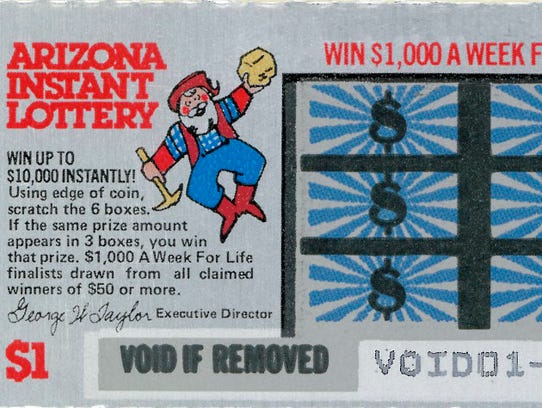(Source: Arizona Republic, July 1, 2016) – The Arizona Lottery celebrates its 35th anniversary Friday. And while that has meant 35 years of big dreams, winning tickets and some dashed hopes, it has also meant 35 years of increased revenue flowing into the state coffers.
Since the Arizona Lottery’s launch on July 1, 1981, its sales revenue has totaled $11 billion, with nearly $3.5 billion of that directed back into state funds and programs. While a majority — and growing — portion of that money has gone into the general fund where the governor and Legislature can spend it as they choose, about $1.8 billion has been returned to Arizona communities through grants and programs that help people who are homeless, victims of domestic abuse and children in the foster care system.
spend it as they choose, about $1.8 billion has been returned to Arizona communities through grants and programs that help people who are homeless, victims of domestic abuse and children in the foster care system.
“Whenever you hear lottery, people always think about jackpots and what they’re going to do with the dollars,” lottery executive director Gregory Edgar said. “But for us, it’s drilling into the numbers and seeing the impact we can have in our community. The investment of $3.5 billion over 35 years is a pretty significant impact.
Changing agendas
- 1980: Arizona voters approved the creation of the Arizona Lottery by a narrow margin. Ballot literature promised proceeds would “pay for law enforcement, health services, education and other vital programs.” But the original proposition wording required only that at least 30 percent of revenue go into the general fund.
- 1990: Voters required that $20 million in lottery revenue a year go into heritage funds for Arizona State Parks and the Arizona Game and Fish Department.
- 1993: Lawmakers required up to $23 million a year in lottery revenue to be put into a fund for local transit projects and up to $7.6 million a year to be divided among counties.
- 1996: Voters required that $17 million in revenue be spent annually on specific health and social-service programs, including teen-pregnancy prevention, food assistance for infants and mothers, and disease research.
- 2010: The Legislature borrowed against future lottery revenue, eliminated allocations to the counties and essentially cut in half lottery allocations to both the transportation fund and the heritage funds, sweeping nearly an extra $30 million a year into the general fund.
- 2015: The Legislature allocated $900,000 a year in lottery revenue to the Internet Crimes Against Children Enforcement Fund, $100,000 to the Victims’ Rights Enforcement Fund and up to $160,000 a year to the tribal college dual enrollment program.
Who really controls the money?
The lottery, overseen by a five-member, governor-appointed commission and an executive director, controls the marketing. But it’s the Legislature that has taken control of where the revenue is allocated.
As lottery revenue has grown and disbursements to specific programs have shrunk or remained stagnant, the Legislature has directed more money into the state’s general fund, where it is impossible to track how specific dollars are spent. That revenue might have gone to schools and public-welfare programs as lawmakers promised and the Lottery markets on its website, or it might have gone to private prisons and lawmaker pensions.
The general fund over the past 35 years has received $1.7 billion. In fiscal 2015, $72 million — 9.7 percent of the lottery’s $750 million in annual revenue — went directly to programs touted to voters. Another $103 million went into the general fund. That compares with 19 percent going to designated programs in both 2005 and 1995. Before the recession, the general fund received about $30 million a year. Over the past several years, the annual allocation has topped $100 million. This year, that trend is expected to continue.

